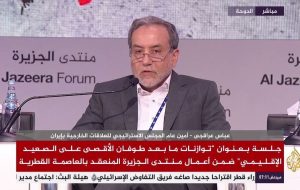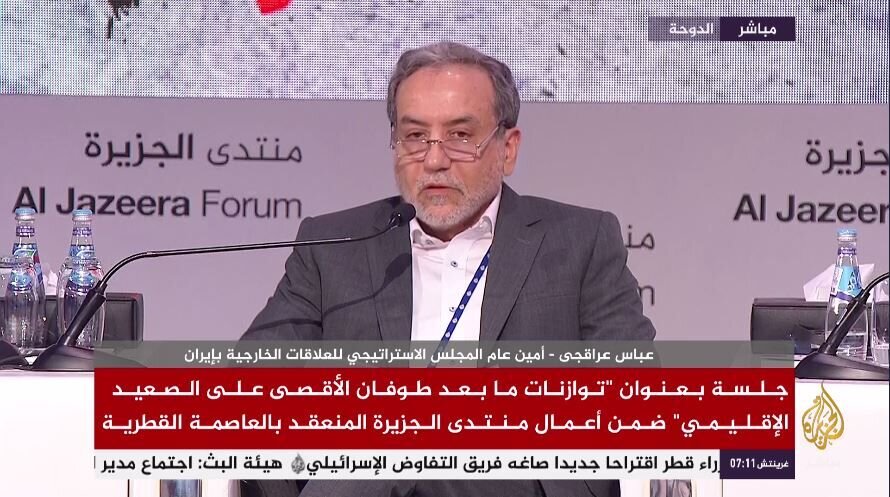Iran warns of Israeli nuclear threat, calls for regime’s disarmament
TEHRAN – Abbas Araghchi, the Secretary of the Strategic Council for Foreign Relations of Iran, has issued a warning, stating that the nuclear threat posed by the Israeli regime will alter the security landscape in the region, compelling other nations to reassess their nuclear stance. Araghchi emphasized Iran’s core principles of unwavering support for the


TEHRAN – Abbas Araghchi, the Secretary of the Strategic Council for Foreign Relations of Iran, has issued a warning, stating that the nuclear threat posed by the Israeli regime will alter the security landscape in the region, compelling other nations to reassess their nuclear stance.
Araghchi emphasized Iran’s core principles of unwavering support for the people and Resistance of Palestine during a panel discussion titled “Transformations in the Middle East after Tufan Al-Aqsa,” held within the framework of a forum by Al Jazeera network in Doha, Qatar.
He reiterated Iran’s opposition to normalizing relations with Israel and expressed concerns to Arab nations that have established or considered relations with Israel, deeming normalization as a betrayal to Palestine and its cause.
Araghchi further underscored Iran’s rejection of the so-called “two-state” solution, asserting that Israel, under any leadership, fundamentally opposes such an arrangement. He advocated for a unified country where all main residents, including Muslims, Jews, and Christians, participate in decision-making through voting.
The Iranian official also remarked on the evolving dynamics in the region, stating that the perceived myth of Israel’s power has crumbled. Araghchi highlighted the growing nuclear tensions fueled by threats from the Zionist regime, including remarks by former and current members of Knesset regarding the potential use of nuclear power.
In addition, Araghchi referenced statements from some American officials, notably Lindsey Graham, who compared the conflict in Gaza to World War II and advocated for the use of atomic bombs, underscoring the gravity of the situation.
While Israel neither confirms nor denies possessing nuclear weapons, Araghchi noted a shift in its strategic ambiguity stance following recent events, raising concerns about the intentions of the current Israeli cabinet.
In his speech, Araghchi emphasized the urgent need for West Asia to be free of nuclear weapons, reiterating calls for the Zionist regime to disarm its nuclear arsenal.
Israel initiated the Gaza conflict on October 7 in response to a surprise retaliatory operation by Palestinian Resistance factions, dubbed Al Aqsa Storm Operation, in the occupied territories.
Simultaneously, the regime has imposed a nearly complete blockade on the coastal enclave, severely limiting the supply of essential goods such as food, medicine, electricity, and water to Palestinians.
During the ongoing war, the regime has caused the deaths of approximately 35,984 Palestinians, predominantly women and children, while another 80,643 Palestinians have been injured, according to the reports from Health Ministry in the battered enclave.
Israel intensified military operations in Gaza despite the UN’s top court ordering it to immediately halt its assault on Rafah. It’s not the first time Israel has refused to comply with an order from the World Court.
